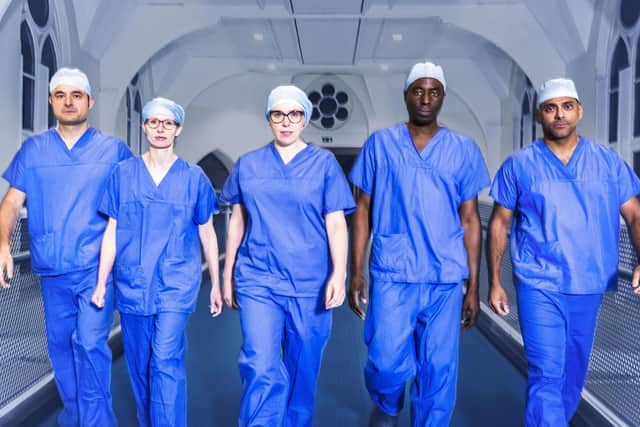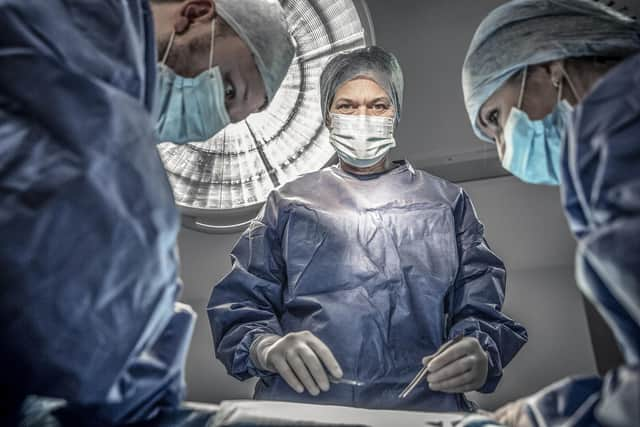Saving Lives in Leeds: How doctors and surgeons are battling long waiting lists to transform patients' lives
“We have the ability to make change and to see that happen,” says Colin, a consultant orthopaedic surgeon with Leeds Teaching Hospitals NHS Trust. “It’s a real privilege to see and treat patients and families and one that never tires.”
Colin features in the new BBC medical documentary series Saving Lives in Leeds, which meets a group of doctors and surgeons at the heart of the trust, as they battle through their ever-increasing waiting lists to transform the lives of their patients.
Advertisement
Hide AdAdvertisement
Hide AdThe programme explores emotional journeys and life-changing operations, against the backdrop of one of the longest waiting lists in NHS history. Each clinician’s caseload takes viewers to the heart of patient stories, lifting the lid on the difficult dilemmas that are faced each day around who is treated next and the impact this has on people and their families.


"Clinical priority determines your ‘ranking’ if you like,” consultant cardiac surgeon Betsy Evans explains. “Each individual responsible for a waiting list has a duty to prioritise on clinical grounds – symptoms will drive a priority, and pathology - certain types of ill-health will take precedence over others. That’s always been the case. What’s hard is moving patients quickly along the line at the moment.”
As a child, Betsy saw first-hand the impact of medicine, witnessing how her ill father’s life was transformed by the care that he received in hospital. It was a motivating factor in her decision to follow her mother’s footsteps and pursue a career as a doctor.
"Surgery was a speciality that I was drawn to because you can see immediately the impact that has been made from an operation,” Betsy says. “There’s a period of initial recovery but by six weeks, it’s amazing how patients report a vast improvement in their symptoms and the gratitude they have about the quality of their future life that they can see will be much improved.”
Advertisement
Hide AdAdvertisement
Hide AdOn a typical week, Betsy, who lives in North Leeds, will spend at least two days in theatre, operating on around four patients during that period. The rest of the time, her work sees her reviewing patients who have been referred for surgery or those who have had it, as well as dedicating time to support people who are immediately recovering in intensive care.


“When I first saw [cardiac surgery] as a junior trainee, I was blown away when I saw the chest cavity open and the heart beating. And it still does that to you because it’s quite an amazing privilege to be able to offer a patient such a transformative operation.”
The process of getting to the operating theatre is not without its challenges. The Covid pandemic, she says, has had a massive impact on patients presenting to clinicians. Many non-urgent elective surgeries were postponed to help the NHS deal with the crisis.
“We’re getting patients at a much further along deteriorated line of ill health. That’s tragic because sometimes patients have missed the opportunity for an operation. Others will have an operation but be at the high risk end of the spectrum.”
Advertisement
Hide AdAdvertisement
Hide AdDemand for orthopaedic surgery is increasing year-on-year, says Colin, who lives in Moortown, Leeds. That is coupled with high demand for beds, particularly during the winter illness period, and staff shortages, in nursing especially.
“No clinician and no family would want to wait longer than they need to for surgery and everyone is working as hard as they can to reduce the wait time as much as we can,” he says.
Colin’s clinical work covers paediatric orthopaedics, as well as adolescent and adult hip surgery. He’s also a clinical director at Leeds Children’s Hospital.
"From a managerial perspective, we try to look at how we can make sure our pathways are as efficient as possible, how we best use taxpayers’ money to provide the best care, looking for efficiencies, looking for recruitment to our nursing roles and sometimes medical gaps as well and making sure that we are the best place to work, as well as giving the best training and research opportunities to staff that are here in Leeds.”
Advertisement
Hide AdAdvertisement
Hide AdA lot of work is being done around capacity to reduce overall waiting times. But Colin says that six-day working may need to be considered to try to help clear the backlog.
As for Saving Lives in Leeds, “it was a brilliant opportunity to highlight the great work that’s done here in Leeds and raise the profile of that,” says Colin.
“Hopefully it gives people a real insight - the families and patients who come in are always very grateful of the great work we do but I can understand sometimes when they get frustrated over timelines not happening. I hope this highlights that everyone is trying to use their time and commitment in the best possible way and sheds a light on some of the challenges that we do have behind the scenes."
Professor Phil Wood, chief executive of the trust adds: “[The programme] really shines a light on the outstanding people working at Leeds Teaching Hospitals carrying out remarkable and world-leading surgery.
Advertisement
Hide AdAdvertisement
Hide Ad"It’s been a really positive opportunity for us to explain the complexity behind some of the decisions we take when managing waiting lists and highlight that we always have our patients’ best interest at the heart of everything we do”.
Saving Lives in Leeds, produced by Label1, is next on BBC 2 on March 8 at 9pm.
